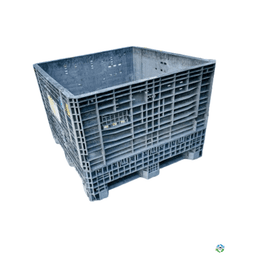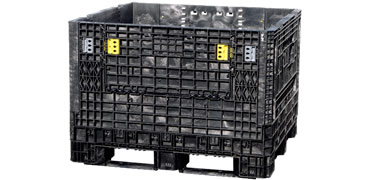How used collapsible bulk containers support eco-conscious operations
Why Mass Containers Are Essential for Sustainable and Cost-Effective Transport
Bulk containers play a necessary function in modern logistics. They promote the effective activity of big quantities of items, consequently optimizing transport processes. This approach not just decreases costs yet also decreases environmental impact with lower emissions and waste generation. As industries seek even more sustainable methods, the adoption of mass containers is coming to be progressively significant. What effects does this shift hold for future logistics and supply chain monitoring?

The Benefits of Utilizing Bulk Containers in Logistics
Bulk containers transform logistics by enhancing efficiency and sustainability. These containers allow for the transport of big quantities of products in a single journey, markedly lowering the variety of journeys called for. This not just enhances operations but also decreases labor prices related to handling, packing, and discharging. Furthermore, bulk containers are made to maximize area usage within transport lorries, making certain that even more items can be shipped simultaneously.
The standardization of mass containers likewise simplifies the logistics procedure. With uniform measurements, they can be easily piled and kept, resulting in boosted storehouse administration. Moreover, mass containers typically include resilient products that secure contents from damages during transportation, thus reducing product loss and raising general integrity. As an outcome, businesses can experience boosted supply chain performance, eventually bring about enhanced productivity and customer fulfillment. This combination of aspects makes mass containers an important property in modern logistics.
Environmental Influence: Reducing Waste and Carbon Footprint
As sectors increasingly focus on sustainability, the fostering of mass containers has become a crucial approach for reducing waste and lowering carbon footprints. These containers decrease making use of packaging materials, such as boxes and plastic, consequently notably reducing total waste generation. By consolidating shipments, bulk containers improve transport performance, permitting more products to be transported per trip. This decrease in journeys straight associates with reduced greenhouse gas exhausts, adding to a smaller sized carbon footprint.
Mass containers can often be recycled or reused, better mitigating ecological influence. The durability of these containers guarantees they can withstand multiple transport cycles, decreasing the requirement for single-use options. refurbished bulk containers. By streamlining logistics and promoting reliable resource usage, mass containers not only support lasting methods however also encourage sectors to line up with international ecological objectives. Eventually, their execution shows a commitment to ecological stewardship and responsible resource monitoring
Expense Cost Savings: How Mass Containers Lower Transportation Expenses
While numerous companies look for ways to boost their profits, using bulk containers offers a considerable possibility for decreasing transportation expenditures. Bulk containers optimize the volume of items delivered, allowing organizations to ship bigger quantities at the same time. This effectiveness reduces the variety of trips needed, directly lowering fuel prices and reducing labor expenditures related to loading and unloading.
Furthermore, bulk containers commonly feature streamlined layouts that enhance room usage within transportation vehicles. This indicates less voids, resulting in extra effective usage of available capability. Furthermore, the longevity of bulk containers can decrease the danger of item damage during transportation, lowering losses and guaranteeing that more products get here intact.
Enhancing Supply Chain Efficiency With Bulk Storage Solutions
Bulk storage options play a crucial role in enhancing supply chain efficiency by optimizing inventory administration. By settling items right into less, bigger containers, organizations can considerably lower taking care of prices related to frequent transfers and processing. This structured strategy permits for far better monitoring and administration of stock, eventually causing enhanced operational performance.
Streamlined Supply Monitoring
Effective supply monitoring is crucial for maximizing supply chain procedures, specifically when organizations adopt bulk storage space options. These options allow services to maintain greater stock degrees while minimizing the regularity of replenishment. By combining materials into mass containers, companies can streamline their supply procedures, minimizing the complexity connected with tracking numerous smaller packages. This strategy promotes precise supply matters and enhances projecting accuracy, allowing for even more informed decision-making. In addition, mass storage services streamline storehouse organization, making it less complicated to find and accessibility items when needed. Consequently, companies can attain a more reliable inventory turnover price, eventually improving total supply chain performance and minimizing the likelihood of stockouts or overstock circumstances.

Lowered Handling Prices
The implementation of bulk storage options not just streamlines supply management but also substantially decreases managing prices across the supply chain. By combining materials into bulk containers, business lessen the demand for frequent handling and transfer between various storage space and transport systems. This technique reduces labor prices connected with loading, dumping, and relocating smaller sized plans. Additionally, bulk storage reduces the frequency of deliveries, leading to reduced transport costs and decreased fuel consumption. Consequently, companies can maximize their logistics procedures, enabling an extra reliable allocation of resources. Ultimately, reduced taking care of prices add to improved overall supply chain efficiency, fostering a setting that sustains both sustainability and economic stability.

Convenience of Mass Containers Throughout Numerous Industries
Although numerous sectors have distinct demands for transport and storage space, mass containers have become a versatile option that fulfills a wide variety of requirements. These containers, ranging from large bins to specialized storage tanks, can fit varied products, consisting of fluids, powders, and granules. In the agricultural sector, bulk containers assist in the transportation of fertilizers and grains, while the food and beverage industry uses them for active ingredients and ended up items. The chemical sector relies upon bulk containers for securely moving unsafe products, making certain conformity with security guidelines. Furthermore, building firms gain from mass containers for carrying accumulations and various other materials. Their adaptability includes numerous settings of transport, consisting of trains, ships, and trucks, boosting logistical performance. This adaptability not only improves procedures across various markets but additionally advertises sustainability by decreasing product packaging waste and maximizing area en route. Consequently, mass containers play a crucial duty in contemporary supply chain monitoring.
Future Fads in Bulk Container Use and Sustainability
The future of bulk container usage is significantly formed by ingenious materials growth that improves sustainability. Additionally, automation in logistics guarantees to streamline procedures, reducing waste and enhancing performance. Welcoming circular economy techniques will additionally revolutionize exactly how bulk containers are designed, utilized, and reused, promoting an extra sustainable transportation landscape.
Cutting-edge Materials Growth
As markets significantly prioritize sustainability, ingenious products growth wholesale containers emerges as a substantial consider enhancing environment-friendly transportation options. Makers and researchers are exploring eco-friendly plastics, recycled composites, and light-weight metals to decrease environmental effect. These products not just minimize waste however also improve gas effectiveness by reducing the overall weight of containers. Additionally, innovations in clever products, which can adapt to varying problems, enhance the toughness and capability of mass containers. The assimilation of these innovative materials aligns with circular economy principles, promoting reuse and recycling. As the demand for sustainable methods expands, the development of such materials will play a crucial function in forming the future of bulk container usage in logistics and transport.
Automation in Logistics
Substantial advancements in automation are poised to transform logistics and the use of mass containers, boosting sustainability in transport. Automated systems, including drones and autonomous vehicles, are streamlining the activity of mass containers, decreasing the reliance on conventional fuel-powered transport. These innovations enhance directing and filling procedures, enhancing and reducing empty miles fuel efficiency. In addition, automated stock monitoring systems enhance monitoring and tracking of bulk containers, ensuring far better source allowance and decreased waste. The integration of the Net of Things (IoT) permits real-time information analysis, making it possible for positive decision-making that aligns with sustainability objectives. As automation remains to advance, it is anticipated to drive better technologies in mass container use, ultimately sustaining more sustainable logistics practices and minimizing the environmental effect of transport.
Circular Economic Situation Practices
Improvements in automation are setting the stage for an extra integrated strategy to round economic situation techniques in the domain name of bulk container usage. As markets increasingly welcome sustainability, mass containers are being designed for durability and reusability. This shift not only minimizes waste but also used collapsible containers enhances resource efficiency. Companies are adopting techniques such as closed-loop systems, where used containers are gathered, refurbished, and reestablished right into the supply chain. In addition, smart innovations track container life cycles, helping with better monitoring and minimizing environmental impact. The cooperation between makers, logistics service providers, and end-users is vital in establishing criteria for sustainable container usage. used bulk containers. Future patterns indicate an expanding focus on products that are recyclable and eco-friendly, further reinforcing the round economic climate's principles in bulk transport

Often Asked Questions
What Products Are Bulk Containers Typically Made From?
Mass containers are generally built from resilient materials such as high-density polyethylene, cardboard, steel, and light weight aluminum. These products supply toughness, security, and flexibility, making them ideal for transferring different goods in various markets successfully.
Just how Do I Select the Right Dimension Mass Container?
Picking the right dimension mass container involves assessing the quantity of materials to be transported, taking into consideration dealing with equipment compatibility, and appraising storage area needs. Correct dimension assurances performance in transportation and minimizes waste throughout delivery.
Are Mass Containers Reusable or Recyclable?
Bulk containers are commonly multiple-use, developed for numerous journeys, boosting sustainability. Many can additionally be reused, depending upon the products utilized. Choosing recyclable alternatives further minimizes and supports ecological objectives waste in transport techniques.
What Safety Regulations Put On Bulk Container Transport?
Security laws for bulk container transportation consist of conformity with the Department of Transportation guidelines, proper labeling of harmful products, architectural integrity evaluations, and adherence to weight restrictions to ensure secure handling and prevent accidents throughout transit.
Exactly How Can Services Change to Using Mass Containers Successfully?
Businesses can alter to bulk containers by reviewing existing logistics, training team on handling, purchasing ideal devices, maximizing inventory monitoring, and working together with distributors to assure compatibility and efficiency throughout the supply chain.
As industries significantly focus on sustainability, the fostering of mass containers has emerged as a key technique for lowering waste and reducing carbon impacts. By settling materials into mass containers, firms can simplify their stock procedures, decreasing the intricacy linked with tracking multiple smaller sized bundles. As sectors significantly focus on sustainability, ingenious products growth in mass containers arises as a substantial aspect in enhancing eco-friendly transport services. Automated systems, consisting of drones and autonomous automobiles, are improving the movement of mass containers, reducing the dependence on typical fuel-powered transport. Additionally, automated inventory monitoring systems enhance tracking and monitoring of mass containers, making sure much better resource appropriation and lowered waste.